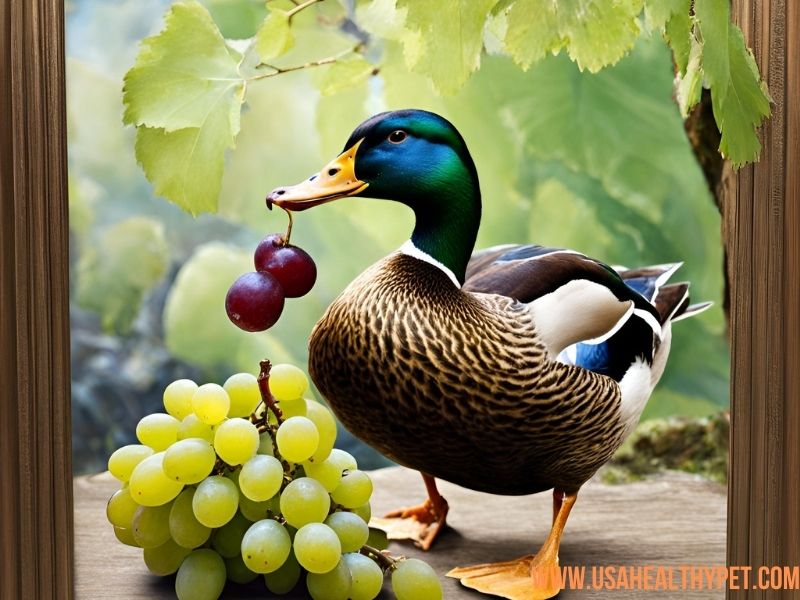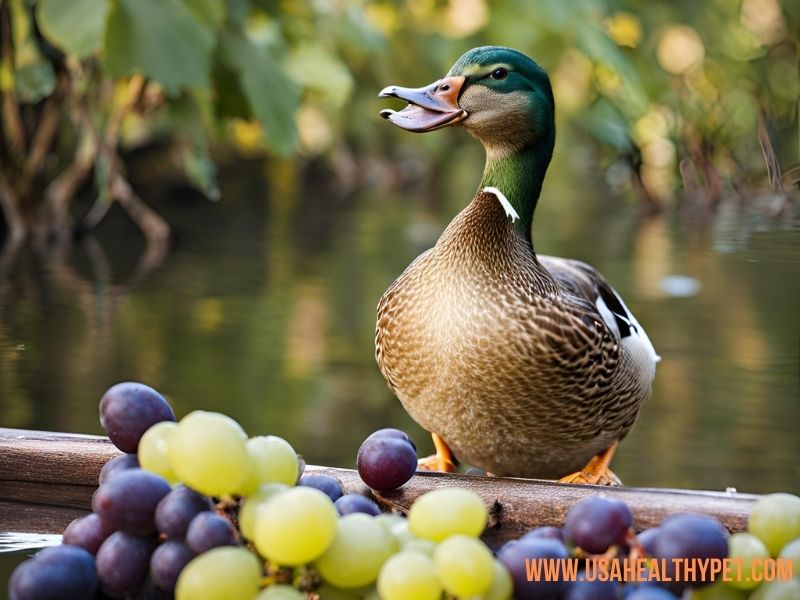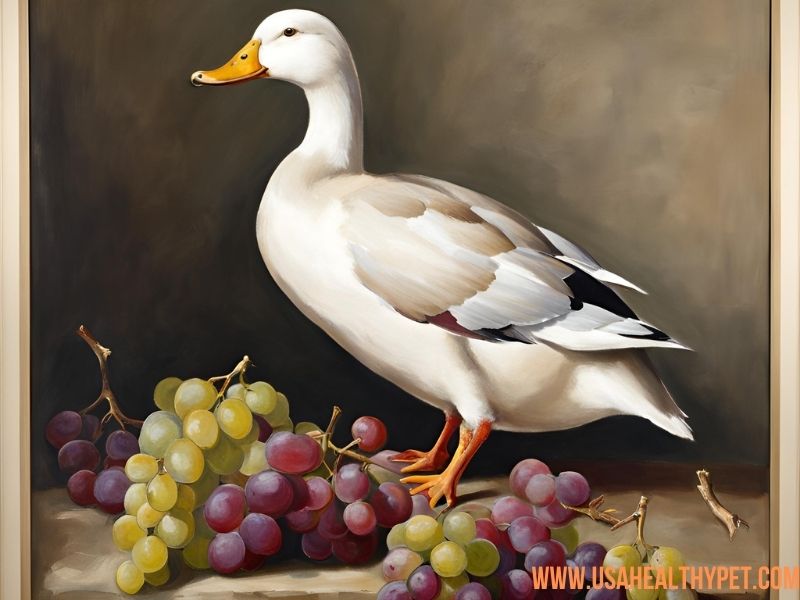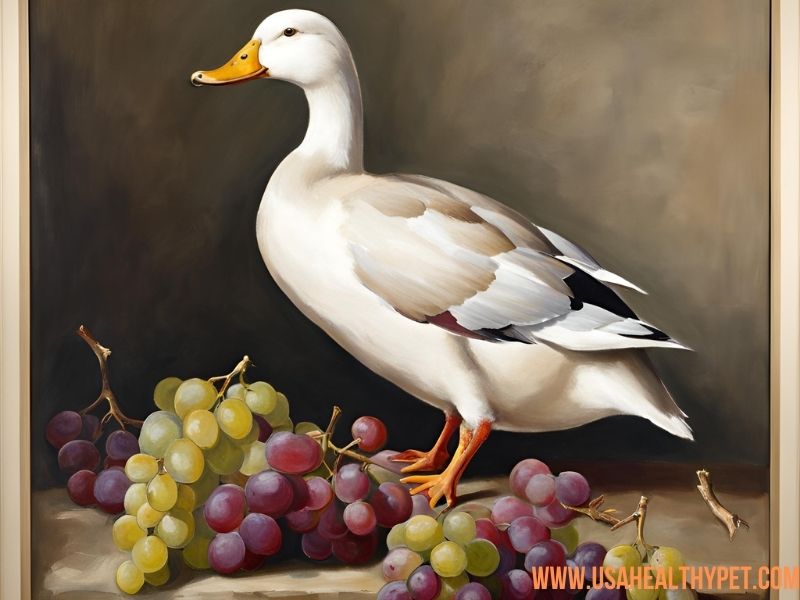If you have a flock of ducks, you’ve probably wondered, Can ducks eat grapes? Maybe you’ve noticed them eyeing your fruit basket. The short answer is yes, ducks can eat grapes! But like with any food, moderation is key.
Feeding your ducks grapes can be a tasty treat for them, but it’s important to understand how to do it safely. In this guide, we’ll explore whether grapes are good for ducks, how to feed them, and what to watch out for. So, let’s dive in!
Are Grapes Safe for Ducks?
Absolutely! Grapes are not toxic to ducks, and most of them will love snacking on this sweet fruit.
However, you should be mindful of a few things. Ducks have sensitive digestive systems, so too much of anything, even something as healthy as grapes, can cause problems.
Grapes are soft, easy to digest, and contain water, which can help keep your ducks hydrated. But there’s a catch—grapes are also high in sugar. While sugar is fine in small amounts, too much can lead to obesity or digestive issues for your feathery friends.
According to Dr. Laurie Hess, a board-certified avian veterinarian, “Fruits like grapes provide important vitamins, but they should only be fed occasionally because of their high sugar content.” Ducks can benefit from grapes as a treat, but experts recommend limiting fruit to less than 10% of their total diet to avoid digestive problems

The Nutritional Value of Grapes
So, what’s in a grape? It turns out that grapes are packed with essential nutrients like:
- Vitamins: Grapes are rich in Vitamin C and Vitamin K, both of which support a duck’s immune system and overall health.
- Antioxidants: Grapes contain antioxidants, which help combat free radicals, supporting longevity and vitality in ducks.
- Water content: Grapes are made up of around 80% water, which can help with hydration, especially during hot weather.
While grapes offer nutritional benefits, they should still be viewed as a snack rather than a staple of your duck’s diet.
Studies published in Poultry Science indicate that grapes offer ducks essential nutrients like Vitamin C and Vitamin K, which help bolster their immune systems.
How Many Grapes Can Ducks Eat?
You might be tempted to throw your ducks a whole bunch of grapes at once, but hold on! Moderation is key.
Think of grapes as candy for ducks—a little goes a long way. Ideally, you should limit treats, like grapes, to around 10% of their daily diet. For an adult duck, this might mean 1-2 grapes, cut into halves or quarters for easier eating.
How to Safely Feed Grapes to Ducks
Before tossing those grapes into your duck pond, there are a few steps you should take to ensure your ducks can safely enjoy them:
- Wash the grapes thoroughly: Grapes often come with pesticides or chemicals on their skin, which can harm ducks.
- Cut them into smaller pieces: Ducks don’t chew like we do, so cutting grapes into halves or quarters makes it easier for them to swallow and prevents choking.
- Serve in moderation: Remember, grapes should be a treat, not a meal replacement!
By following these simple steps, you’ll keep your ducks happy and healthy while enjoying their new favorite snack.
According to Dr. Karen Becker, “Overfeeding sugary fruits like grapes can upset a duck’s digestive balance and contribute to obesity.”
Benefits of Feeding Grapes to Ducks
Ducks can benefit from grapes in several ways:
- Hydration: As mentioned earlier, grapes are full of water, which can be particularly helpful during the hot summer months.
- Boosted immune system: The vitamins and antioxidants found in grapes can help strengthen your ducks’ immune systems, keeping them healthier and more resilient.
- Variety in diet: Just like us, ducks appreciate some variety in their diet. Offering treats like grapes can add excitement and enrichment to their daily routine.

Potential Risks of Grapes for Ducks
While grapes are generally safe, there are some risks to keep in mind. First, overfeeding grapes can lead to diarrhea due to their high sugar and water content.
This might leave your ducks feeling uncomfortable and lead to dehydration. Second, grapes should be cut into small pieces to avoid choking hazards, especially for younger ducks.
Lastly, be cautious about feeding too many sugary fruits like grapes, as this can lead to weight gain, which may result in other health complications down the road.
Alternatives to Grapes for Ducks
If your ducks aren’t big fans of grapes, don’t worry! There are plenty of other fruits they can enjoy. Here are some great alternatives to grapes:
- Blueberries: Packed with antioxidants and easy for ducks to eat.
- Apples: A crunchy treat (just be sure to remove the seeds).
- Watermelon: Perfect for hydration in the summer months.
- Bananas: Soft and easy to digest, but feed them in moderation due to the high sugar content.
Can Baby Ducks Eat Grapes?
Baby ducks (ducklings) have more delicate systems compared to adult ducks. While they can technically eat grapes, it’s best to wait until they’re at least four weeks old before introducing this treat.
Even then, grapes should be cut into very tiny pieces and only offered sparingly. Their primary diet should still be nutritionally complete starter feed for ducklings.

Signs of Overfeeding Grapes
How do you know if your ducks have had too many grapes? Here are some signs to look out for:
- Diarrhea: This is the most common symptom of overfeeding grapes due to their high water and sugar content.
- Lethargy: Ducks that have consumed too much sugar might seem sluggish or inactive.
- Weight gain: Over time, excessive treats can lead to obesity, which can impact their ability to move around and forage.
If you notice any of these signs, cut back on treats and ensure your ducks are eating a balanced diet.
What to Do If Your Duck Overeats Grapes
If your duck overeats grapes and experiences digestive issues, it’s essential to provide plenty of fresh water. This will help flush out any excess sugar and rehydrate them.
You should also withhold grapes and any other treats for a few days to allow their digestive system to settle.
Other Fruits Ducks Can Eat
In addition to grapes, ducks can enjoy a variety of other fruits. Some favorites include:
- Strawberries
- Peaches
- Pears
- Raspberries
- Blackberries
Just remember the golden rule—moderation!
Fruits Ducks Should Avoid
Not all fruits are safe for ducks. Some fruits and their parts can be toxic or harmful. Avoid feeding your ducks:
- Avocados: The skin and pit contain toxins that are dangerous to ducks.
- Citrus fruits: Oranges, lemons, and limes can interfere with calcium absorption and should be avoided.
- Dried fruits: These are often too high in sugar and can cause digestive upset.
Conclusion: Should You Feed Grapes to Ducks?
In short, ducks can absolutely eat grapes! They’re a fun, tasty treat that offers hydration and a boost of vitamins. Just remember to feed them in moderation and always cut them into smaller pieces.
Keeping your ducks’ diet balanced and healthy’ll ensure they’re happy, thriving, and waddling around for years to come. Ready to treat your ducks to some grapes? Start small and watch their excitement grow!
FAQs About Ducks and Grapes
Q1: Can ducks eat grape skins?
Yes, ducks can eat grape skins, but make sure to wash them thoroughly to remove pesticides.
Q2: How often can I give grapes to my ducks?
It’s best to offer grapes as a treat once or twice a week, not as a regular part of their diet.
Q3: Should I remove grape seeds before feeding?
Grapes sold today are often seedless, but if you’re feeding grapes with seeds, it’s better to remove them to avoid choking.
Q4: Can ducks eat raisins?
Raisins are dried grapes and are much higher in sugar, so it’s better to avoid feeding them to ducks.
Q5: What happens if my duck chokes on a grape?
If your duck chokes, try to gently encourage them to expel it, but if the situation worsens, seek veterinary help immediately.
